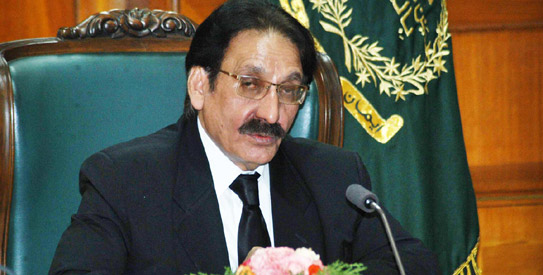
ISLAMABAD: Chief Justice Iftikhar Mohammad Chaudhry ruled out on Wednesday setting up of military courts again in the country, saying a constitutional court of ultimate jurisdiction had permanently closed doors for establishment of such courts. “While we are here, all matters will be handled constitutionally,” he remarked during the hearing of a reference filed by President Asif Ali Zardari under Article 186, urging the court to revisit the Z. A. Bhutto murder case.
An 11-judge bench, headed by the chief justice, is hearing the reference.
Justice Chaudhry said the system was being governed by the Constitution and not by military courts. He said supremacy of the Constitution was linked to its strict adherence by the judiciary, adding that the court had held military courts unconstitutional in the Liaquat Hussain case.
Speaking at a meeting of the party’s Sindh Council in Karachi on Monday, PML-N chief Nawaz Sharif had said his party would again establish military courts in Sindh if voted to power in the next general elections. The idea was instantly rejected by Prime Minister Yousuf Raza Gilani, who said there was no room for military courts in a democratic dispensation.
The chief justice’s remarks marked the first reaction from the judiciary over the debate on establishment of military courts.
He ruled out military takeovers in future, saying that there was no room for military rule in the country and the adventurism of the past was enough.
Sindh Advocate General Fateh Malik argued that the reference had been filed to seek opinion of the court on questions of law and not a second review of the judgment that was called a judicial mistake by many. He said the architect of the 1973 Constitution had been hanged and the court must do justice.
The chief justice said the court needed to see if it could revisit any duly decided case under its advisory jurisdiction. He observed that reopening of the case could open a Pandora’s box and encourage hundreds of convicts to file application for revisiting their cases as whatever decision was taken would set a precedence for the future.
He said it would be in the fitness of things if the reference was defended on legal and constitutional grounds, instead of emotional arguments.
The Sindh advocate general pointed out that the court had expanded its jurisdiction by hearing PML-N President Nawaz Sharif’s case after years. The chief justice replied that his case was not filed under Article 186 of the Constitution.
Justice Sarmad Jalal Osmani observed that the law was same for everyone. He said the Bhutto case was unique in history of the country.
Justice Saqib Nisar observed that parliament was the forum for remedy sought in the reference.
Appearing before the court as amicus curiae, Fakhruddin G. Ebrahim said the court had to decide whether the trial in the case was legal or illegal and what was the apex court’s jurisdiction with respect to Article 186 of the Constitution and the presidential reference.
He pointed out that one of the judges of the bench, which had heard the Bhutto case, had confessed in a TV programme that he was under immense pressure to deliver verdict against Z. A. Bhutto, saying it was sufficient to prove bias in the trial. He said it was the blackest day in the judicial history of the country.
Mr Ebrahim said during martial law, a judge had one eye on the law and the other on the GHQ, whereas military dictator kept judges in his pocket.
Abdul Hafeez Pirzada, another amicus curiae, said there was no prayer in the reference and opinion of the court had been sought if Mr Bhutto’s conviction was legally correct or otherwise.
He said it was a prerogative of the president to decide which matter was of public importance and which issue should be sent to the Supreme Court to solicit its opinion.
The hearing will continue on Thursday.












































Dear visitor, the comments section is undergoing an overhaul and will return soon.